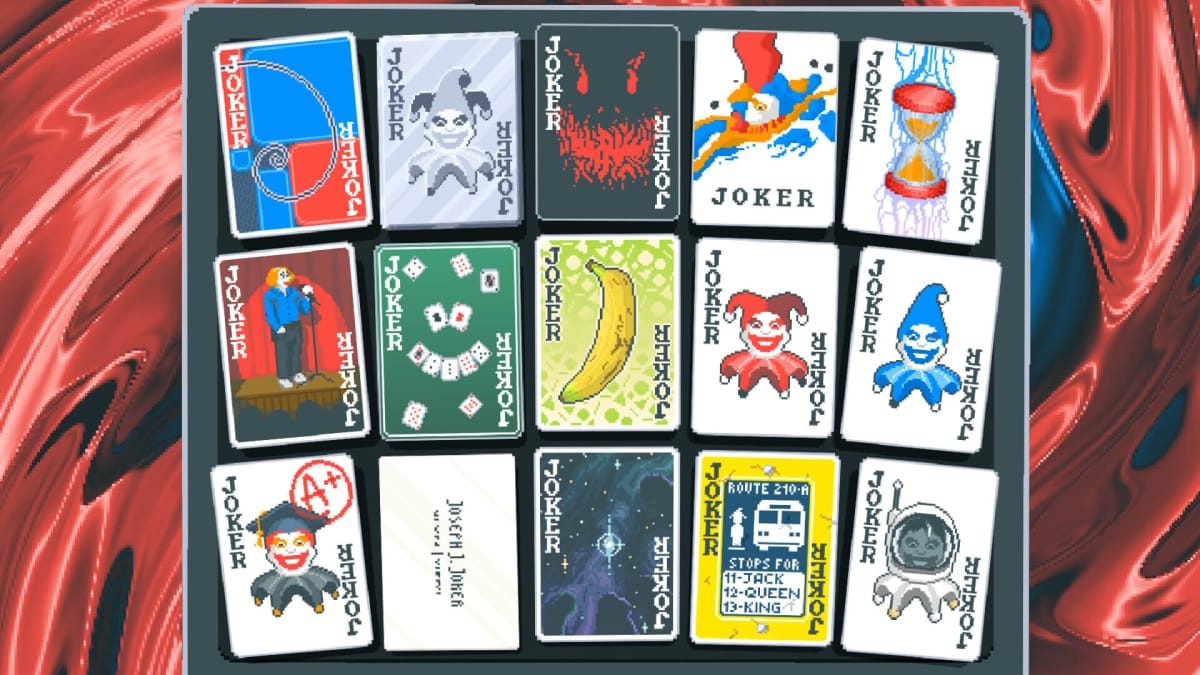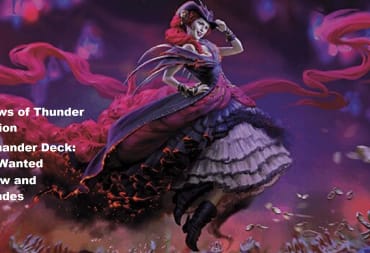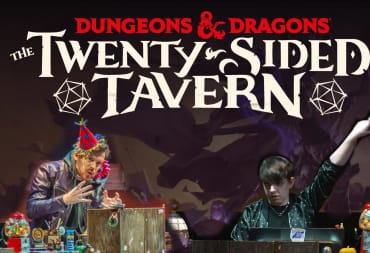We’re barely through the first quarter of 2024, and already, we have a runaway success in the form of the deck-building roguelike Balatro. Fresh out of its early-access phase, the debut commercial release for solo developer LocalThunk has already broken a million units sold in less than a month, and it’s showing no signs of stopping.
Initially, I was uninterested. In my mind, I only have time for one deck-building roguelike, and Slay the Spire has been my masochistic go-to for Ascension 20 runs, with enough depth to satisfy but not be alienated from it. Nevertheless, I purchased it, and 120 hours later, I’m yet to even break the surface as to what’s possible with Balatro.
As a blueprint, it utilizes Texas Hold-’em and turns it upside down with the inclusion of a score system, “Joker” Cards that can amplify certain play styles, and bosses that seek to disrupt said play styles. There are other mechanics, but at its core? It’s an ever-changing, constantly fluctuating battle of wits that, while offering a victory, plays into the make-or-break ethos that Texas Hold-’em - and Poker in general - tend to offer.
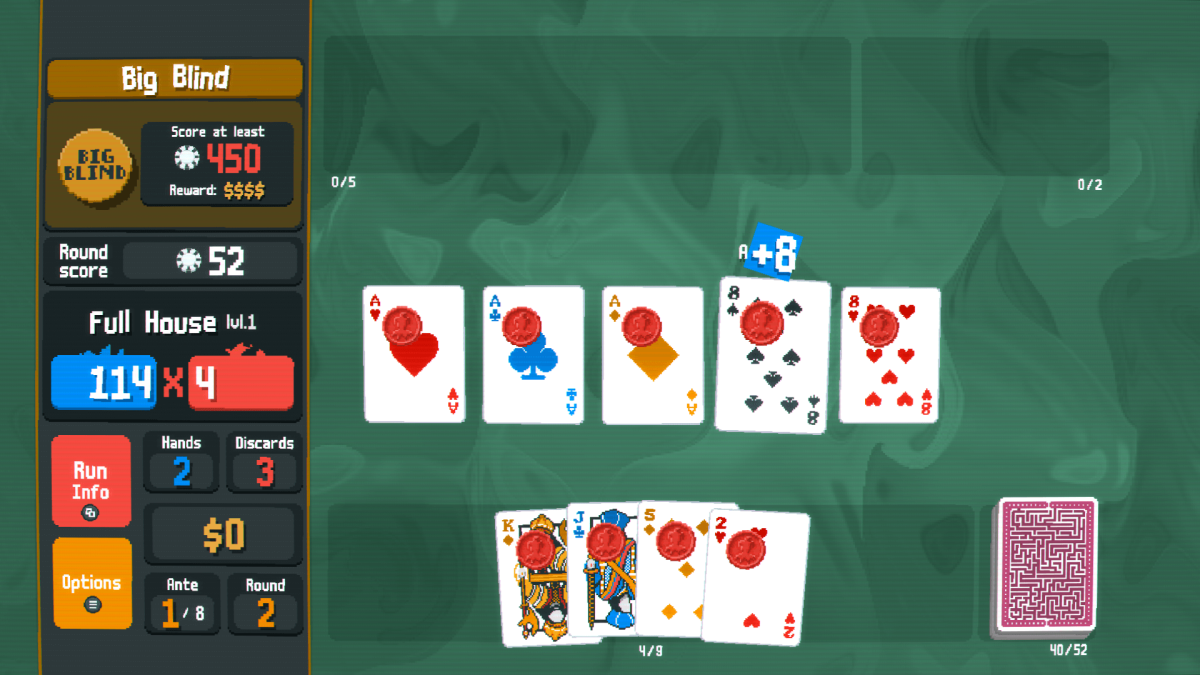
House of the Rising Sun
It’s an enthralling game to watch unfold as a player or a spectator, utilizing progression and survival in a similar vein to the recent trend of auto-battlers, and to great effect.
It’s not just a race to the proverbial top, but an endorphin rush that runs parallel to the type of screen-shaking, integer-breaking, visually glitchy haven that titles like Vampire Survivors and Army of Ruin execute brilliantly. Of course, it works a little bit differently in Balatro, but the goal remains the same regardless: Make the number go up.
With that in mind, there’s a secret ingredient in what makes Balatro so compelling, and that’s the act of gambling itself. While this is something that any and all roguelikes interact with in some shape or form, like the Crooked Coin in The Binding of Isaac or the Engineer class in SYNTHETIK, Balatro operates in such a specifically innate state. It’s all organic, playing on the rules of a pre-existing game to grow conceivably from there.
After all, roguelikes tend to operate on builds that optimize one specific good thing you’ve got going, whether it’s a Ludovico set-up in The Binding of Isaac or a dark orb deck in Slay the Spire. It’s less about multitudes, and more about a direct all-in approach that, by and large, tends to pay off. I’m sure everyone has had a moment in a roguelike run where they know they’ve won it upon the pick-up of a certain item.
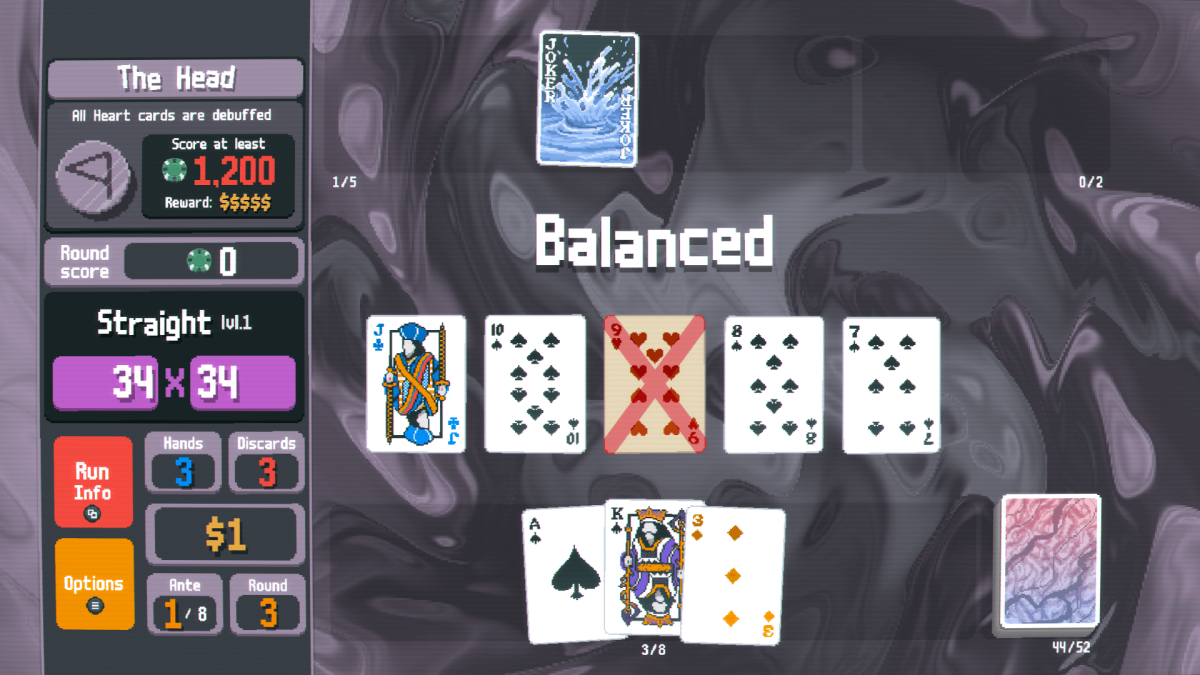
Balatro has these same opportunities, but not nearly to the same extent. The game doesn’t seem to acknowledge the concept of a “meta” since Poker is so nebulous in its victory conditions. While it’s true that there are Jokers in the game that graciously hand a win, it’s rather easy to stumble upon a victory without the requirement of these Jokers, mostly due to the sheer amount of synergies on offer.
If you’re a casual player, there’s a good chance you get through by the skin of your teeth. Swapping out Jokers occasionally, choosing to play different hands, and quite literally playing the hand you’re dealt is a large factor of Balatro’s allure: the fact that it can feel like a raw fight for everything you’ve earned, and if you’ve not got enough? That’s it, you’re broke.
Can you win Balatro? Yes, but like with most of these roguelikes, it’s with caveats. When you finish the 8th level (or Ante 8), the game declares a victory with your current build and marks it as such, but in big shining letters, “Endless Mode” hovers with temptation.
This is where the real test begins. Soon, the score threshold multiplies into the millions, the billions, and then eventually, numbers represented by scientific notations (Example: 1.410e11, or 141,000,000,000,000).
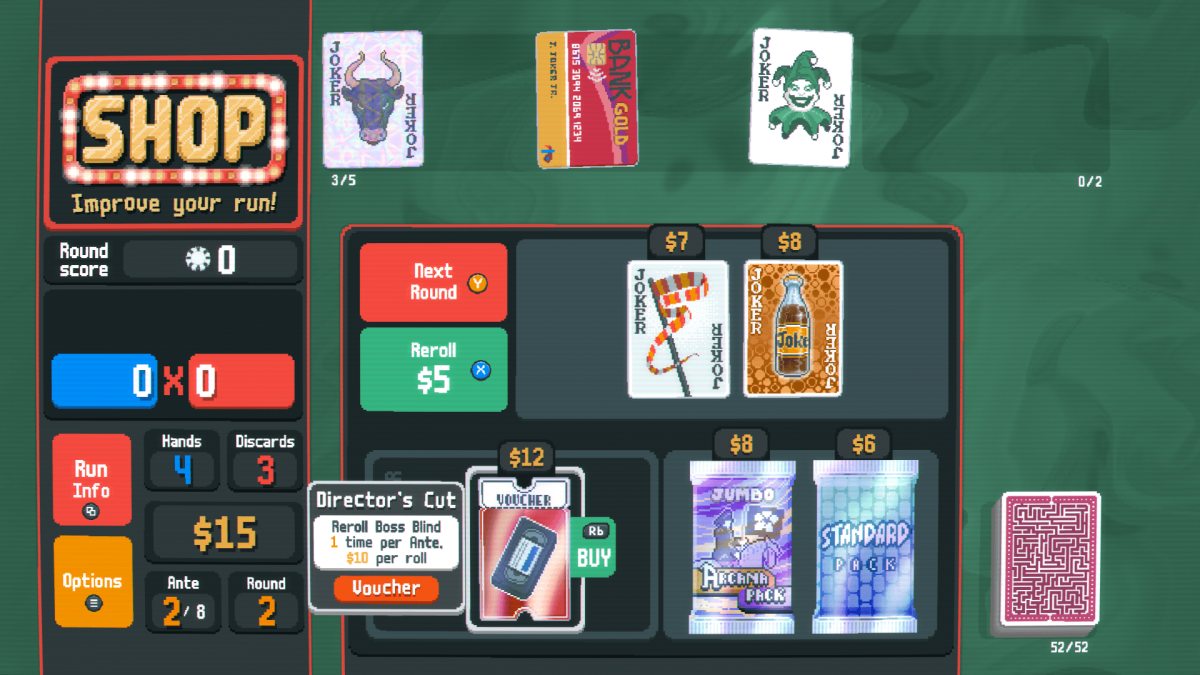
The House Always Wins
In its structure, it invites a challenge, and at first glance, it appears to scale with a crawl. With other endless modes seen in games like Vampire Survivors or Brotato, there’s always a point where you can idle the game, sit back and look on as a tesseract forms inside your monitor.
Balatro can be the same but like the casinos that offer the same opportunity, it preys on the confident beliefs that you, the player, have somehow cheated the system.
It’s a tried-and-true narrative; the cocky card shark comes to a table with a dealer who’s uninterested in their methods, and whatever formula they’ve concocted in their head to win.
What Endless Mode in Balatro presents is the notion that victory cannot come, even if all the money in the world was involved, because in reality, it’s not possible. It rarely ever is.
One good hand leads to a streak, and a larger bet, and one bad hand after that leads to excuses. It’s everybody else’s fault that their strategy didn’t work, but as we know, the only winning move is not to play, and by then, it’s too late. Riches are a universal temptress.
It’s also one of the first roguelikes that - without being a strict auto-battler like the two mentioned above - offers an endless mode to begin with, which speaks to its illegitimate grounds for victory. You can slay the titular Spire, as it were, and you can enter (and appropriately exit) the Gungeon, but Balatro’s lack of a tangible foe - the only communicable face being a floating Joker spouting puns - posits the question: Who am I beating here?
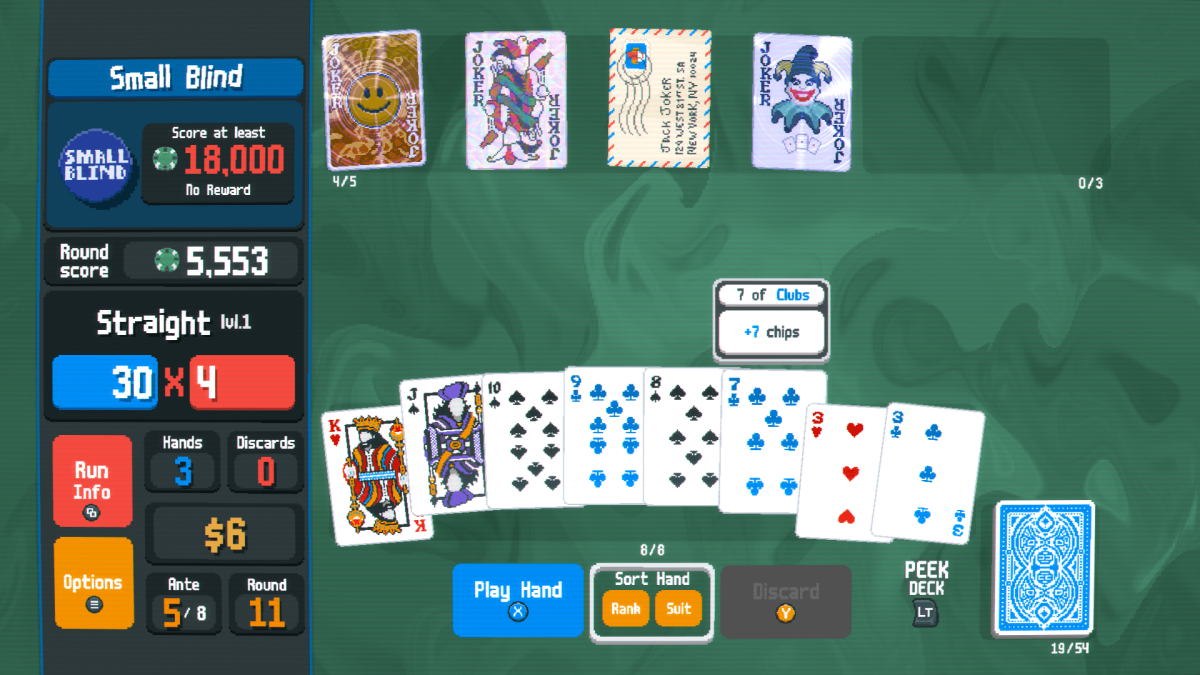
As saccharine and as cliche as it is to say, that foe is yourself. Knowing when to stop, knowing that you can cash-in on a victory, unlock new Jokers, come back with a renewed vigor if you’re not on a hot one. What Endless Mode in Balatro presents is the notion that victory cannot come, even if all the money in the world was involved, because in reality, it’s not possible. It rarely ever is.
Now, before we continue, Balatro can end in Endless Mode. In a YouTube video posted by “Balatro University” they show that the end of the game is “Ante 39,” where you have to beat the score threshold of “NaN,” as in “Not a Number.”
In computer talk, this is a number being reached that the game cannot virtually register, since it’s undefined. As such, once you reach such a mighty theoretical number, the result is a game over, as you’ve broken the game; a kill screen, if you will.
You can chalk this up to just programming shenanigans, which is all fine and dandy, but there is legitimate commentary being - at worst, unintentionally made - about the potential damage that can be done by pursuing a suffocating amount of riches to the point where everything is on the line.
Sometimes the cards aren’t in your favor, even when you’ve made it as such, and you’re not supposed to beat Balatro, much in the same way that you can’t beat the House. It’s their ground after all.
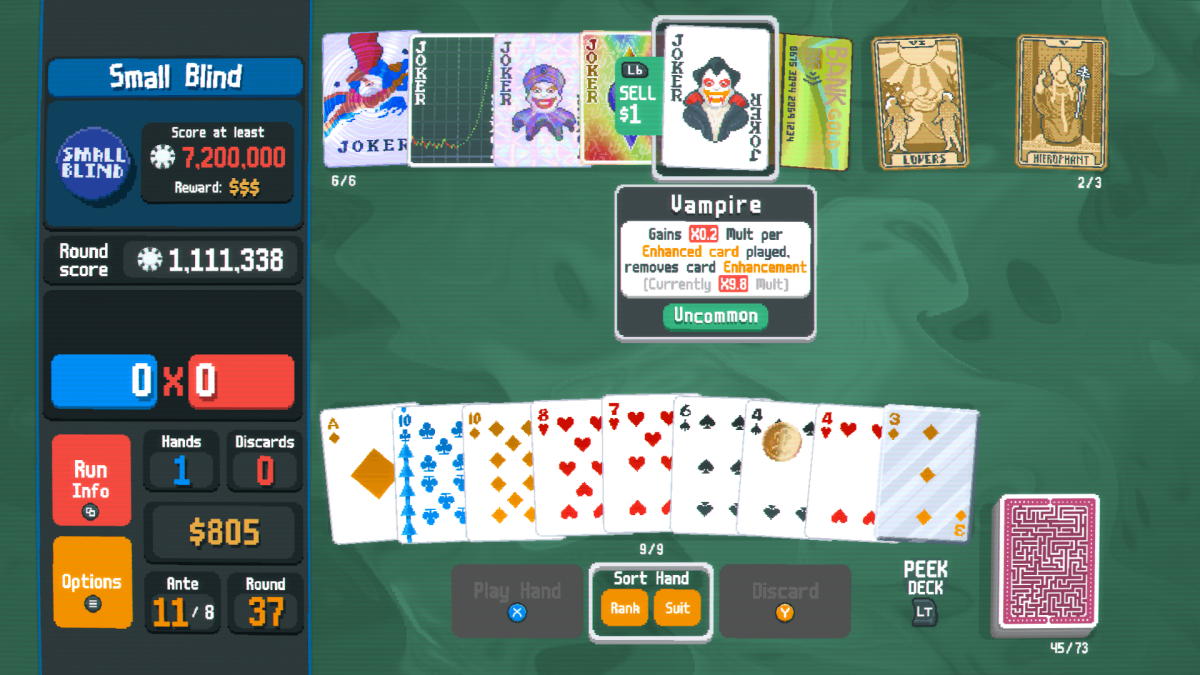
Heaven or Las Vegas
A few weeks after Balatro’s release, developer LocalThunk had run into issues with an age rating board after it was deemed that the initial age rating of “3+” was too low, changing it to an “18+.” It was said that the prominent gambling imagery on display also included material that instructed players on how to gamble, which is a half-truth. It’s a rule-set that cannot be applied anywhere else in the world, but in the rating board’s defense, it was a decision made out of reactionary fear.
It’s a common meme at this point, the whole “80% of gamblers quit just before they hit the BIG TIME!” that’s made in jest, while also undermining a fairly legitimate concern. After all, ludomania has become such a worry that many institutes, like Gamblers Anonymous, offer support for mental health issues that stem from such an addiction.
Not only that, but it’s so easy to fall into it based on what gambling can represent: Casinos, scratch cards, loot boxes, slot machines, roulettes, competitions with insane entry rates.
I’ve been in the hole myself. Down to my last couple coins, no income on the horizon, and I venture into an off-license. I slam the pennies down, ask for two scratch cards and cross my fingers and toes before I aggressively start clawing away in a corner in the hopes I’ve made my money back. Even better that I could be one of the four people that the card promises will win 300k, which I deserve! On a rainy day, a gift like that would surely come my way!
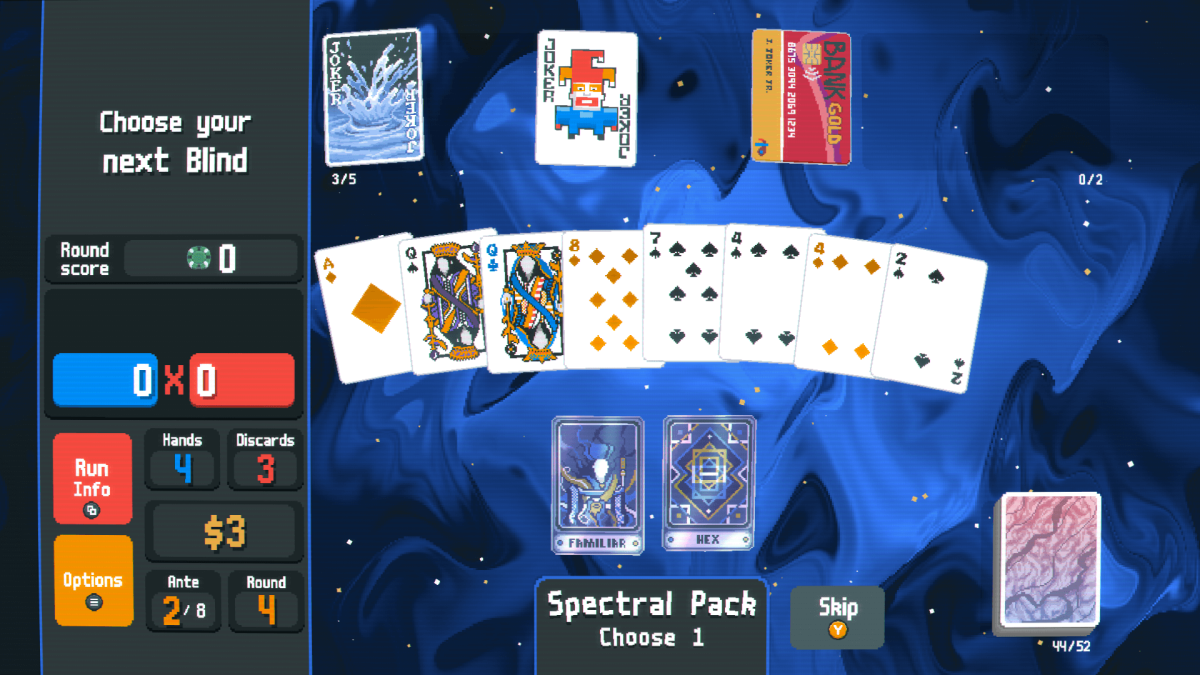
I look at a game like Balatro and I see that it’s addictive, but it’s addiction without compromise or losses, except that of time. It’s remarkably easy to pick up, to formulate strategies, and to manipulate, without being a blueprint for further gambling endeavors.
Under the right player, whether it’s a card shark down on their luck or someone who takes gambling to the point of worrying harm, this is a placebo, a replacement for the real thing, and it can inform and educate when and where to stop. Both victory and defeat are clearly telegraphed.
Look at the lights, listen to the solitary jingle that plays constantly; an intertwining progression of lounge music underneath a bit-crushed sound font. You’re not in a casino, let alone Vegas, but there’s enough of an aesthetic - the felt tables, the cards being racked, the dings that play with every card played - to make it feel like you’re there, a clinical champion card counter, dazzling the dealer with devious decisions.
Balatro is an enthralling piece of escapist entertainment, and it’s a very eloquent one, teaching you about restraint and the impossibilities that a game bigger than you can present. This isn’t an opponent you’re meant to beat, but to engage with on shared terms, and its addiction is a sign that they’re a fair player. A fair enough player to respect you when the House won’t.
Have a tip, or want to point out something we missed? Leave a Comment or e-mail us at tips@techraptor.net
